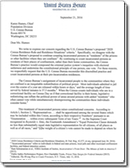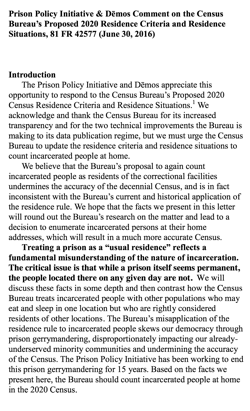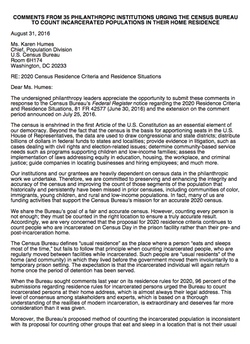Thirteen Senators call on the Census Bureau to count incarcerated people at home starting in the 2020 Census.
by Aleks Kajstura,
September 30, 2016

In a letter sent to the Census Bureau last week, 13 United States Senators request that the Census Bureau count incarcerated people as residents of their homes in the 2020 Census.
The Senators highlight both practical and constitutional reasons to count incarcerated people at home, concluding:
To ensure that all people are fairly counted as part of their home communities, and in pursuit of our constitutional ideals, we join this chorus of support to ask that the Census Bureau act without delay to correct for this inequality in the 2020 Census.
The Senators’ request echoes 100,000 other voices submitted in comments to the Census Bureau last month. You can read the Senators’ letter in our collection of the comments the Bureau received in 2016.
Court allows prison gerrymandering in Cranston, RI. City still has no logical reason for counting all people incarcerated by the state as residents of a single ward.
September 21, 2016
The following statement was issued today by representatives of the ACLU of Rhode Island, Demos, the Prison Policy Initiative and the ACLU:
"Today, the U.S. Circuit Court of Appeals for the First Circuit overturned a ruling issued earlier this year by U.S. District Judge Ronald Lagueux, who had held that the City of Cranston violated the one person, one vote requirements of the U.S. Constitution when it allocated the entire incarcerated population of the Adult Correctional Institutions (ACI) as 'residents' of one ward of the City when it drew district lines for the City Council and School Committee following the 2010 Census and thereby created significant distortions in local representation. A panel of the First Circuit instead ruled that a recent U.S. Supreme Court ruling dictated a different outcome.
"We respectfully, but strongly, disagree with the First Circuit's ruling. We believe the panel misinterpreted the Supreme Court's recent Evenwel v. Abbott case as vindicating the City's position when it did no such thing. As a result of that misinterpretation, the panel opinion fails to adequately address the critical 'one person, one vote' implications of Cranston's use of prison gerrymandering to overinflate the representation of constituents in the school committee and city council districts where the ACI is located. As a result, we will strongly be considering filing a petition for rehearing of the case before the entire First Circuit.
"To this day, we have heard no logical basis for the City's decision to count the entire ACI population as residing in a single City ward even though people incarcerated there who are able to vote generally are barred from voting there according to state law. In addition to the constitutional concerns, the City's choice is not rational. The prison population is wholly physically and politically isolated from the surrounding community, and local elected officials do not represent those incarcerated at the ACI in any meaningful way. This provides yet another reason for us to consider seeking an en banc rehearing, as well as for the City Council itself to fix this issue for elections in future years, as it had started to do before this appeal was filed.
"During this campaign season, serious concerns and questions about electoral fairness are being raised and felt across the country. Like those disputes, this case goes to the heart of the importance of fair representation, something that Cranston's current system simply does not provide."
Background on the Lawsuit
At issue in the lawsuit was the City of Cranston's choice to count the more than three thousand inmates at the ACI in a single city ward for the purposes of drawing City Council and School Committee districts. Judge Lagueux had agreed with the ACLU and other plaintiffs that this "prison gerrymandering" was improper because those incarcerated at the ACI are not actual constituents of local elected officials, but instead remain residents of their pre-incarceration communities for virtually all legal purposes, including voting. Due to the questionable counting, all persons incarcerated by the state of Rhode Island are used to account for 25 percent of Ward 6's total "population." According to Census Bureau data, without the non-resident incarcerated population, Ward 6 has only 10,227 true constituents. Yet those constituents now wield the same political power as the roughly 13,500 constituents in each of the other wards.
The case is Davidson et. al. v. City of Cranston. Today's decision and others documents in the case be found here.
Plaintiffs in the case were represented by attorneys with Demos, the Prison Policy Initiative, the ACLU and the ACLU of Rhode Island.
An overview of the comment letters calling on the Census Bureau to end prison gerrymandering.
by Peter Wagner,
September 8, 2016
In June, the Census Bureau announced plans to continue counting incarcerated people as residents of their prison, not home, addresses in the 2020 Census, and invited public comments on their proposal. Almost 100,000 people including civil rights organizations, elected officials at all levels of government, former Directors of the Census Bureau and citizens from across the country weighed in to tell the Census Bureau that a prison is not a residence.
The comment period closed last week on September 1 and a final decision is expected by the end of the year. The Bureau won’t publish the comments it received until that time, but a large sample is available now at http://www.prisonersofthecensus.org/letters/FRN2016.html
One key theme in these comments is that:
Treating a prison as a “usual residence” reflects a fundamental misunderstanding of the nature of incarceration. The critical issue is that while a prison itself seems permanent, the people located there on any given day are not.
The Prison Policy Initiative and our long-time partners at Dēmos submitted an in-depth 18 page comment that corrects the Census Bureau’s fundamental misunderstanding of incarceration and explains that while a prison stay is temporary, an incarcerated person’s connection to his or her home is enduring.
Many other organizations made very substantial contributions of criminal justice data, demographic data, and legal research as well. For example, the Vera Institute of Justice analyzed never seen before data from Washington, Oregon, and Nebraska to show that the median time at the current facility on April 1st, 2015 was less than nine months.
LatinoJustice PRLDEF questioned why the Census Bureau recognizes the family and community ties of boarding school students and members of Congress to count them at their home addresses, but fails to give incarcerated people the same consideration. Several elected officials made it clear that residents of their jurisdictions remain their constituents — and continue to look to them for representation — even when incarceration forcibly moves these constituents to different counties and states. This same point about residence was also made by a former correctional officer who observed that incarcerated people were not regarded as fellow constituents by nearby residents in her county.
There were also several important petitions. Leaders of 35 foundations, including Ford Foundation, Annie E. Casey Foundation and Bauman Foundation, explained their need for accurate Census data and urged the Bureau to recognize that incarcerated people should be counted at home. 39 civil rights groups joined with The Leadership Conference on Civil and Human Rights to call for a fair and accurate 2020 Census. Daily Kos organized 29,000 of their members to send individual messages to the Census Bureau and 48,314 of their members to sign a petition. CREDO Action also asked its members to submit public comments calling for an end to prison gerrymandering, with more than 47,600 doing so.
The Prison Policy Initiative would like to thank everyone who submitted a comment calling for a fair and accurate 2020 Census. Stay tuned to http://www.prisonersofthecensus.org for more analysis and updates on next steps.
Our comment letter to the Census Bureau makes four key arguments for ending prison gerrymandering.
by Alison Walsh,
September 6, 2016

Last year, the Census Bureau requested comments on the 2020 Decennial Census Residence Rule and Residence Situations and received 162 comments on the topic of where to count incarcerated people. 96% of these comments favored counting incarcerated people at their home addresses. But the Bureau ignored the overwhelming public input and, in June, announced plans to continue the outdated and inaccurate practice of counting incarcerated people as “residents” of prison locations.
The Census Bureau seeks to count everyone at his or her “usual residence,” defined as the place where a person “eats and sleeps most of the time.” In our response to the Bureau’s latest request for comments, we and our partners at Dēmos make it clear that a prison cell is not a usual residence under this definition, and the consequences of the prison miscount extend far beyond correctional facility walls.
Our comment letter makes four key arguments:
Apart from how short a time any given person spends at any given facility, the total length of individual sentences of persons in state prisons is much shorter than is routinely assumed. (pp 2-5)
Other similarly situated people are counted at home, while incarcerated people are strangely singled out to be counted in the wrong place. (pp 5-11)
We believe, on factual, practical, and legal grounds, that the Bureau is incorrect in asserting that it can cede all responsibility for producing useful redistricting data to state governments. (pp 11-13)
Most people in the country are harmed by prison gerrymandering to one extent or another. (pp 13-15)
As more and more jurisdictions are eliminating prison gerrymandering within their borders, and federal courts twice this year declared prison gerrymandering unconstitutional, the Census Bureau should heed the growing consensus and count incarcerated people in the right place in the next Census.
Though we think it’s a good read, our full comment letter is 18 pages long. So we summarized the main arguments and data in one handy fact sheet.
35 foundation leaders urge the Census Bureau to count incarcerated people at home for a fair and accurate 2020 Census.
by Alison Walsh,
September 2, 2016

The Census Bureau has heard from a range of voices on the issue of where to count incarcerated people for the 2020 Census. Last year, a chorus of civil rights and voting rights organizations, legislators, law professors, and formerly incarcerated individuals all asked the Bureau to update its methodology and start counting incarcerated at their home addresses. Despite this consensus, the Bureau announced plans last June to continue counting incarcerated people as “residents” of prison facilities.
On Wednesday, 35 foundation leaders – representing organizations such as the Ford Foundation, Annie E. Casey Foundation, and Bauman Foundation – joined together and also urged the Census Bureau to end the prison miscount. They explain the importance of an accurate census count both in their work and for communities they serve:
Our institutions and our grantees are heavily dependent on census data in the philanthropic work we undertake. Therefore, we are committed to preserving and enhancing the integrity and accuracy of the census and improving the count of those segments of the population that historically and persistently have been missed in prior censuses, including communities of color, immigrants, young children, and rural and low-income populations. In fact, many of us are funding activities that support the Census Bureau’s mission for an accurate 2020 census. […]
[C]ounting every person is not enough; they must be counted in the right location to ensure a truly accurate result.
The coalition finds two key problems with the Census Bureau’s proposal: it overlooks the true meaning of a “usual residence” and goes against public input.
The Census Bureau seeks to count everyone at his or her “usual residence,” defined as the place where a person “eats and sleeps most of the time.” Following this guideline should lead the Bureau to count incarcerated people at their home communities. “Such people are ‘usual residents’ of the home (and community) in which they lived before the government moved them involuntarily to a temporary prison setting.” Incarceration, the authors point out, “is a temporary stay.” People in correctional facilities “have a usual home elsewhere to which they will eventually return once the sentence is served.”
Furthermore, the foundation leaders note that the Census Bureau’s proposal ignores the overwhelming call for change.
When the Bureau sought comments last year on its residence rules for 2020, 96 percent of the submissions regarding residence rules for incarcerated persons urged the Bureau to count incarcerated persons at their home address, which is almost always their legal address. This level of consensus among stakeholders and experts, which is based on a thorough understanding of the realities of modern incarceration, is extraordinary and deserves far more consideration than it was given.
In the past, the Census Bureau has demonstrated a willingness to change its policies in response to unique living situations. “Those changes, however, have not extended to counting incarcerated people in the right place.” For example, the Bureau decided to count military personnel deployed overseas at their home addresses in 2020, “even though there were far fewer comments related to this subject than on the prison miscount.”
Still, it is not too late for the Bureau to lay the groundwork for an accurate 2020 Census by finally deciding to count incarcerated people at home. The coalition concludes: “We hope the Bureau’s final 2020 Census Residence Criteria reflects this change for the 2020 Census.”
Read their full letter






